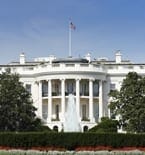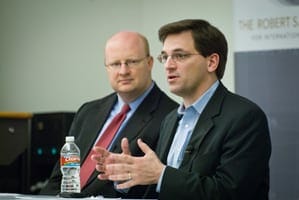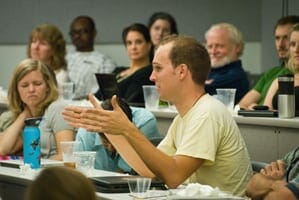By Program

Covering the White House in the Age of Clinton, Bush, and Obama
April 21, 2011 | 12:15:00 | Sid Richardson Hall Room 3.123

The Robert S. Strauss Center for International Security and Law welcomed Peter Baker, chief White House correspondent of the New York Times on April 21, 2011. William Inboden, Strauss Center Distinguished Scholar, introduced Mr. Baker and moderated the event.
Mr. Baker opened the discussion by noting how former presidents tend to develop friendships despite having often campaigned against one another. President Clinton was known for his intellectual curiosity and his disregard for sticking to strict schedules. President Bush, on the other hand, was rigorous in his adherence to schedules. President Obama has demonstrated tendencies reminiscent of both Clinton and Bush, at times opting for free-flowing dialogue with the press and occasionally exercising tight control over his administration’s interactions with the public.

Mr. Baker discussed the common misconception of President Bush’s lack of intellectual prowess, describing how President Bush often impressed audiences in private with his understanding of complex issues. Mr. Baker attributed the different perceptions of Clinton and Bush to calculated decisions made by both presidents, where Clinton was comfortable as an intellectual raconteur, Bush was more concerned with depicting himself as accessible and relatable.
Turning to foreign policy, Mr. Baker acknowledged that while President Obama has restored international “goodwill”¬ù toward the United States, many of his policies are not fundamentally at odds with those of his predecessor. Mr. Baker disparaged efforts by commentators struggling to characterize President Obama as Lincoln, Johnson, Roosevelt, or any of his other predecessors. The administration is currently trying to liken itself to the Reagan administration.

Turning to questions from the audience, Mr. Baker discussed the effects of digital media on journalism, noting that Wikileaks has begun to filter their releases to protect particularly sensitive information. Mr. Baker does not defend Wikileaks, but does justify the New York Times’ handling of information provided by Wikileaks. The effects of cable news on more traditional media outlets like the Times and social media’s new role in journalism were also topics of conversation.
Prior to joining the Times in 2008, Baker was a reporter at The Washington Post for 20 years, covering both the Clinton and George W. Bush administrations. He co-authored the original story breaking the Monica Lewinsky scandal and wrote about the subsequent impeachment proceedings. He also covered the Iraq war and Hurricane Katrina during Bush’s second term, and won the Gerald R. Ford Prize for Distinguished Coverage of the Presidency. Baker was the first American newspaper journalist to report from rebel-held northern Afghanistan after Sept. 11, 2001. He is author of the bestselling book “The Breach: Inside the Impeachment and Trial of William Jefferson Clinton,”¬ù and co-author of “Kremlin Rising: Vladimir Putin’s Russia and the End of Revolution.”¬ù He is currently working on a book about the Bush presidency for Doubleday.
Watch the full presentation below:


